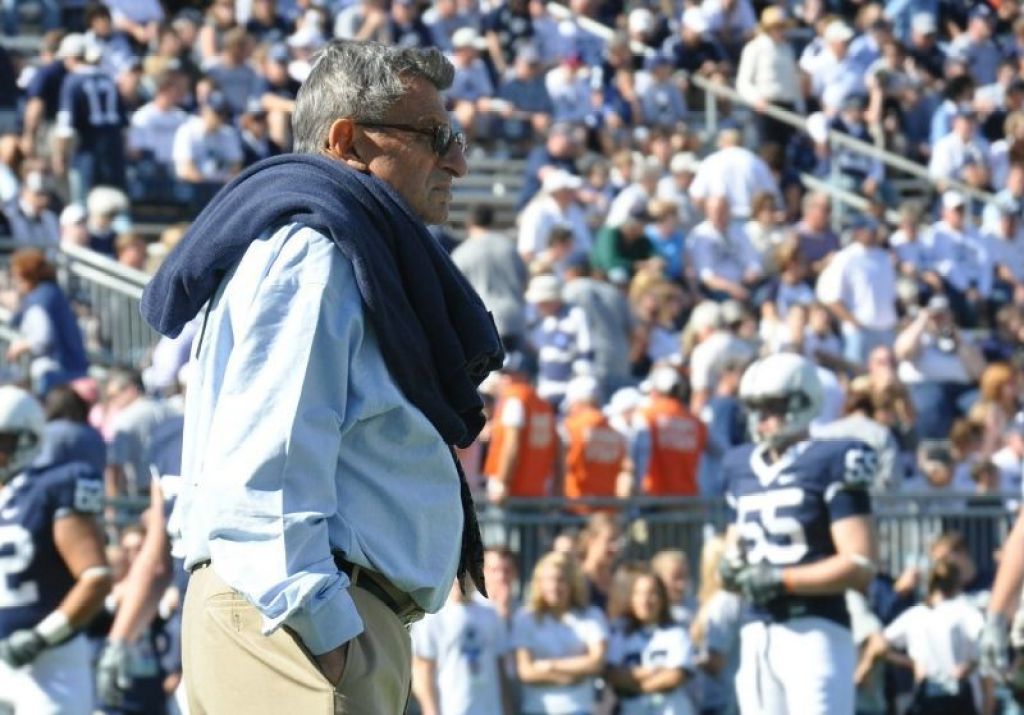This story was produced by the State College regional bureau of Spotlight PA, an independent, nonpartisan newsroom dedicated to investigative and public-service journalism for Pennsylvania. Sign up for our north-central Pa. newsletter, Talk of the Town, at spotlightpa.org/newsletters/talkofthetown.
STATE COLLEGE — Penn State trustees and high-ranking university representatives met privately twice in January to discuss whether to name the football field at Beaver Stadium after former coach Joe Paterno, according to three people with direct knowledge of the conversations.
The meetings potentially violate a state law that requires governing bodies to conduct business in public view, and continue a decadelong pattern of the board convening behind closed doors.
A group of trustees are pushing to name the football field after Paterno, while board and university officials are hesitant, according to the three sources, who requested anonymity because they were not authorized to speak openly about the discussions.
The board fired Paterno in 2011 during the fallout of the Jerry Sandusky child sex abuse scandal. A statue of Paterno outside the football stadium was removed, and the NCAA vacated more than 100 wins from Paterno’s record. The wins were later restored, and Paterno holds the record for most wins in NCAA football history with 409.
The trustees met for hours on Jan. 16 for a “briefing” on the matter — a gathering not previously disclosed to the public — and again Jan. 29 in “executive session,” according to the sources. The meetings were held behind closed doors to avoid public discussions on the topic, the sources said.
When asked for comment on the meetings, an unnamed Penn State spokesperson wrote via email: “The Administration and the Board of Trustees have embarked on numerous change initiatives based on President Bendapudi’s vision and goals and are focused on these priorities to continue to provide a world-class academic and student experience for years to come.”
The university’s board is required under state law to deliberate its decisions in public. The law does allow groups to hold private executive sessions, but only to discuss specific topics — pending or current litigation, internal investigations, academic standings and employment or property negotiations.
The Penn State spokesperson wrote of the Jan. 16 gathering that “counsel conducted this privileged informational briefing and no deliberation occurred.” The spokesperson added that trustees discussed “confidential and privileged matters” during their Jan. 29 executive session and that the private meeting was legal under the law’s exemptions.
Discussing whether to name something after a former coach likely does not fall under any of the executive session requirements, said Melissa Melewsky, media law counsel for the Pennsylvania NewsMedia Association, of which Spotlight PA is a member.
“The public is entitled to see how decisions are made, not just the final vote,” Melewsky said. “That’s why deliberation is expressly required to be public.”
Previous Spotlight PA reporting revealed how the Board of Trustees employed a questionable legal interpretation of the state’s open public meetings law, known as the Sunshine Act, to privately discuss the university’s multimillion-dollar budget deficit and the previous administration’s diversity plan.
Spotlight PA, in partnership with the Reporters Committee for Freedom of the Press, sued the trustees in December for alleged violations of the Sunshine Act. The suit argues the trustees illegally conducted public business in private. University officials contend they have always followed the law, and the suit is pending in the Centre County Court of Common Pleas.
The board’s discussions on Paterno come as the university implements $94 million in budget reductions. The cuts are expected to deeply affect Penn State’s Commonwealth Campuses and could cancel some academic programs beginning in mid-2025. The university said in a recent statement that it would be “virtually impossible” to implement the reductions without job losses.
According to the three people familiar with the Paterno discussions, some trustees and university leaders have argued that now is not the right time to honor the former coach.
Paterno was Penn State’s head football coach for 45 years and won two national championships until the board fired him in November 2011 during the Sandusky scandal.
In 2012, Sandusky was convicted on 45 counts of child sex abuse and sentenced to up to 60 years in prison. Former university President Graham Spanier, former athletic director Tim Curley and former vice president Gary Schultz also served jail time related to the scandal. Spanier was convicted of child endangerment, a misdemeanor. Curley and Schultz pleaded guilty to the same offense.
Paterno was never charged. He died in January 2012.
One of Penn State’s libraries is named after Paterno and his wife, Sue. The university also continues the Paterno Fellows Program, and the former coach has a plaque on Penn State football’s “Wall of Honor.”
Whether the board would pass a proposal to honor the former coach is unclear. Such a move would likely first need to be approved by the board’s finance committee, which oversees “the honorific naming of buildings and roads,” according to the board’s bylaws. The committee is scheduled to vote on renaming a chemistry building at its meeting today.
Penn State’s full board is scheduled to meet Friday. Neither agenda mentions Paterno.
SUPPORT THIS JOURNALISM and help us reinvigorate local news in north-central Pennsylvania at spotlightpa.org/donate/statecollege. Spotlight PA is funded by foundations and readers like you who are committed to accountability and public-service journalism that gets results.



